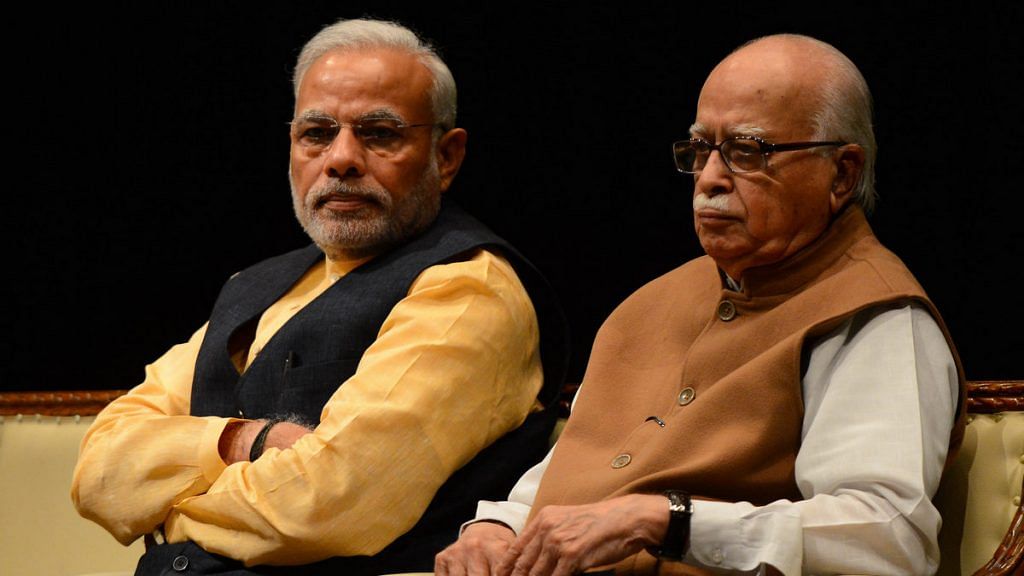New Delhi: Prime Minister Narendra Modi, senior BJP leaders Murli Manohar Joshi, L.K. Advani, and RSS chief Mohan Bhagwat cannot attend the bhoomi pujan ceremony of the Ram temple in Ayodhya next week if the event follows the SOPs (standard operating procedures) issued by the health ministry for religious places in June.
According to the SOPs, “People above 65 years of age, persons with comorbidities, pregnant women and children below the age of 10 years are advised to stay at home. Organisations managing the religious institutions to advise accordingly.”
The SOPs issued by the Ministry of Home Affairs this week as part of the Unlock 3.0 guidelines also advises people above 65 years of age to stay at home.
But the BJP brass invited for the ceremony — PM Modi (69), Murli Manohar Joshi (86), L.K. Advani (92), Bhagwat (69), RSS general secretary Suresh Bhaiyyaji Joshi (73) and former Uttar Pradesh CM Kalyan Singh (88) — are above 65 years of age.
Among the high-profile invitees, who meet the age criteria, are Vinay Katiyar, who is 65 years old, and Uma Bharti, who is 61.
The government’s Unlock 3.0 guidelines also ban religious congregations or large gatherings.
Meanwhile, a priest and 14 policemen posted at the Ram temple site have tested positive for Covid-19.
Also read: Ram temple ceremony a BJP-RSS event, party stealing credit — Congress over not being invited
‘SOPs already issued’
The government maintained that the Ram temple event will be held by following the SOPs already issued for religious gatherings.
Replying to a question from ThePrint on whether any guidelines were being issued to the government of Uttar Pradesh for organising the event, Rajesh Bhushan, OSD in the Ministry of Health, said: “Health ministry has already issued an SOP, which is in the public domain.
“When instructions were issued by the Ministry of Home Affairs during Unlock 2.0, we had issued multiple SOPs, one of which related to safe practices in religious places,” he added.
Elaborating on the SOPs, which were actually issued in the beginning of Unlock 1.0 in June, joint secretary Lav Agarwal said: “The SOPs lay down all measures, including social distancing, that need to be put in place so that such gatherings do not cause spread of infection.
“Our major aim for such social events should be to control the spread of infection, maintain the essential do gaj ki doori (distance of six feet or nearly 2 metres). The SOPs lay down how environmental sanitation should be ensured, how respiratory hygiene practices should be followed and the kind of orientation and precautions that the people attending the event need to be given,” he added.
According to the Unlock 3.0 guidelines issued on 29 July, all activities are allowed outside containment zones, except educational institutions, swimming pools, bars, restaurants, assembly halls etc.
It also bars “social/political/sports/entertainment/academic/cultural/religious functions and other large congregations”.
The guidelines say: “Dates for restarting the above activities may be decided separately and necessary SOPs shall be issued for ensuring social distancing and to contain the spread of Covid-19”.
SOPs for religious places
The SOPs released on 4 June in the beginning of Unlock 1.0, specifically for religious places stated that the maintenance of a 6-feet distance in public places is mandatory “as far as feasible”.
“Use of face covers/masks to be mandatory. Practice frequent hand-washing with soap (for at least 40-60 seconds) even when hands are not visibly dirty. Use of alcohol-based hand sanitisers (for at least 20 seconds) can be made wherever feasible.
“Respiratory etiquette to be strictly followed. This involves strict practice of covering one’s mouth and nose while coughing/sneezing with a tissue/handkerchief/flexed elbow and disposing of used tissues properly. Spitting should be strictly prohibited. Installation and use of Aarogya Setu App shall be advised to all.”
It forbade any distribution of prasad, asked religious places to organise frequent cleaning and staggering of visitors, and placing hand sanitisers and thermal scanners at the entrance.
Also read: Ram Temple foundation to have water, earth from ‘thousands of holy rivers, shrines’, says VHP
